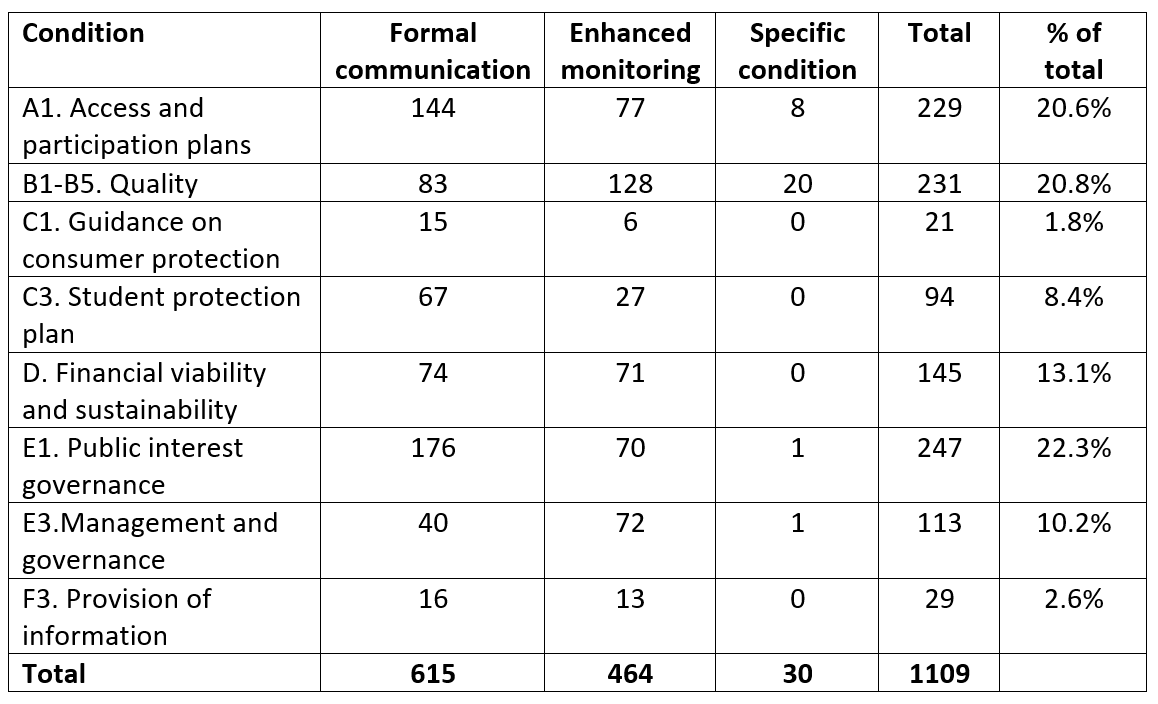The Office for Students (OfS) has published an assessment of the registration process and resulting outcomes for 2019-20 (OfS 2019.30). The report offers insights into the way OfS assessed providers seeking to become registered between 30 April 2018 and 23 October 2019. To the end date, a total of 387 providers had been registered by OfS. The majority of providers (375; c.97%) had some form of intervention imposed on them.
Overview of process and outcomes
The OfS acknowledges that the registration process was “was complex, and needed to be carried out with rigour and to a high standard” and was completed against a short time-line. However, it believes that a number of applications it received were of poor quality, suggesting a “number of providers were not ready to be regulated.”
Types of regulatory interventions
Based on the assessed level of risk, the OfS uses three levels of intervention.
- Formal communication: alerts the provider that there may be a regulatory intervention in future if action is not taken.
- Enhanced monitoring: imposed where OfS requires a provider to act, or more frequent or intensive monitoring is deemed necessary.
- Specific ongoing conditions: normally applies where there is an increased risk of a breach in the conditions of registration, or the provider has not addressed a specific risk.
Number of regulatory interventions
During the period covered, OfS made 1109 regulatory interventions. Some 193 providers (53% of the total number of registered providers) were subject to 2 or less regulatory interventions; with 17 providers (4%) subject to 7 or more regulatory interventions. The majority of interventions involved a formal communication (56%), with enhanced monitoring accounting for a further 42%.
Areas of concern
OfS suggests many of the applications were lacking in respect of:
- Student protection plans: the quality of plans varied, and 266 providers were asked to resubmit their plans as part of the assessment process. As a temporary measure OfS approved a number of plans it considered to be “significantly below the standard we would expect.”
- Value for money: very few providers considered this area from the perspective of the student.
- Fit and proper persons: most providers relied upon self-declarations by Governors/Trustees; OfS is unclear as to where any checks were carried-out by providers. There was also widespread non-disclosure on the applications submitted about the directorships and trusteeships held by individuals.
- Management and governance arrangements: many providers were unable to provide convincing evidence of effectiveness, with a large number of providers failing to evidence any external input into a review of their arrangements, relying instead on desk-based information.
- Financial viability and sustainability: a significant number of providers based their assessment on optimistic forecasts of a growth in student numbers, without providing convincing evidence to justify their projections.
Areas with the most frequent recorded interventions
Table 1 provides a summary on the number and level of regulatory intervention associated with the conditions of registration made by OfS.
Table 1 Regulatory interventions across conditions of registration

Source: OfS 2019.30. Table 7, p.21.
The three areas where OfS made the highest level of regulatory interventions were E1 Public interest governance (22.3% of total), B1-B5 Quality (20.8%) and Access and participation plans (20.6%).
Sub-dividing B1-B5 by the individual conditions of registration shows all 20 of the specific conditions were associated with B3 Quality (Student Outcomes). Based on total interventions, B3 accounted for 13.2% of all regulatory interventions.
Analysis of regulatory interventions
OfS offers a detailed analysis of regulatory interventions in relation to each of the initial conditions of registration (see OfS 2019.30, pp.22-40). For example, for the 3 most frequent areas of intervention the following comments apply:
- A1. Access and participation plans – fair access and participation is a key objective for the OfS and “there is an expectation of continuous improvement in ambition and practice.” Only 12 providers received no regulatory intervention
- B1-B5. Quality – the main reasons for interventions related to concerns about student continuation rates; and in, some cases, the rate of progression to professional employment or further study.
- E1. Public interest governance – common weaknesses, included a failure to recognise that codes of governance did not fully cover all public interest principles; a failure to ensure value-for-money was transparent to students; and the assessment of “fit and proper” persons.
Forthcoming publication
Based on its analysis, the OfS is intending to publish new regulatory guidance in autumn 2019.
Conclusions
The establishment of the OfS has brought significant changes to the way higher education providers in England are regulated. The process of initial registration was demanding on all parties. Providers sought to quickly understand and respond to the new regulatory requirements, while OfS was required to process a large number of applications for registration against a tight time-scale.
Join the conversation
Governors and governance professionals can respond to this news alert in our Advance HE Connect governance groups. We would love to hear your thoughts on:
Drawing on your own experience and OfS’ assessment of the registration process and outcomes, how do you see the relationship between the OfS and higher education providers evolving over the next year?